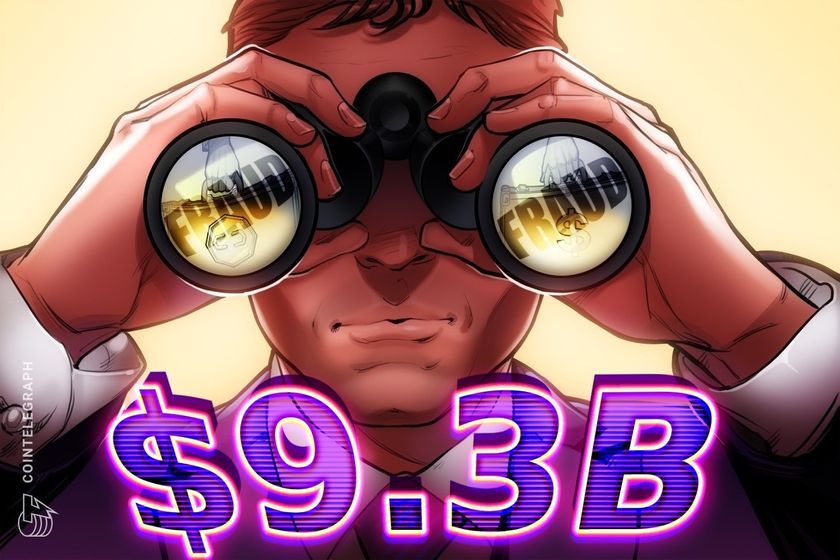
by Cointelegraph by Zoltan Vardai | 24 Apr 2025 | Crypto Law |
Bitcoin’s price trajectory may be suppressed ahead of its upcoming “omega candle” rally, according to Prince Filip Karađorđević, the hereditary prince of Serbia and Yugoslavia.In an April 24 interview with Simply Bitcoin, Filip said some market participants may be limiting Bitcoin (BTC) price action.“People are able to control the market to some extent,” he said. “Maybe that’s what acted on the 2021 market that suppressed its price from jumping high up. We could get that again in 2025, but there will be one point where [Bitcoin price] will run away.”Filip added that Bitcoin remains a fundamentally deflationary asset and said its value is “always going to rise over time.”Source: Simply BitcoinHe referenced the concept of the “omega candle,” made popular by Bitcoin advocate and Jan3 CEO Samson Mow. The theory predicts Bitcoin’s growth trajectory will explode after it hits the $100,000 mark.Related: Bitcoin acting ‘less Nasdaq,’ more like gold, despite 60% recession odds“You’ll start to go up by 10,000 a day or drop by 10,000 a day. And this is the God candle. After that, we’ll start to see omega candles, which are 100,000 increments daily,” said Mow in an exclusive interview with Cointelegraph in November 2024.Factors contributing to Bitcoin’s growth include the growing distrust in the traditional financial system, according to Mow.Related: Bitcoin ETFs log $912M inflows in ‘dramatic’ investor sentiment boostETF inflows, macro relief drive momentumBitcoin price saw an over 9% recovery over the past week as the US spot Bitcoin exchange-traded funds (ETFs) accumulated over $2.2 billion worth of Bitcoin in the three days leading up to April 23, Farside Investors’ data shows.Source: Farside InvestorsThe price action is in line “with our Bitcoin relative strength expectations with respect to equities and the dollar,” analysts from Bitfinex exchange told Cointelegraph, adding:“Bitcoin is rallying due to a combination of macro relief, strong ETF inflows, and growing expectations that the Fed will maintain policy flexibility amid softening economic data.”Bitcoin may continue to see more upside if “equities continue higher during earnings week,” but the “still-elevated macro uncertainty could limit broad-based upside,” the analysts added.Stock and cryptocurrency investors are also concerned about a potential recession in the US. JPMorgan estimates a 60% probability for a recession in 2025, citing US President Donald Trump’s 145% tariffs on China as a “material threat to growth” that increases the odds of an economic downturn.Magazine: Bitcoin’s odds of June highs, SOL’s $485M outflows, and more: Hodler’s Digest, March 2 – 8

by Cointelegraph by Ezra Reguerra | 24 Apr 2025 | Crypto Law |
A bill that would allow New Hampshire to invest a portion of its state funds in digital assets and precious metals has advanced to a full Senate vote after passing a second committee.On April 23, House Bill 302 (HB 302) was reviewed in the second Senate committee and passed in a 4-1 vote.The legislation, introduced in January, cleared the New Hampshire House earlier this month in a 192–179 vote. It now faces a vote by the full Senate and, if approved, will require the governor’s signature to become law.Once enacted, it would allow the New Hampshire treasury to use 10% of the state’s general funds to invest in crypto with a market cap of over $500 billion — a threshold currently met only by Bitcoin (BTC).Source: Bitcoin LawsDemocratic representative opposes New Hampshire’s crypto reserve bill During a debate before the full House vote, Democratic Representative Terry Spahr argued that the bill is unnecessary. The lawmaker said it could undermine the future security of the state’s digital asset stockpile. Spahr argued that the state treasurer already has the authority to manage investments without the bill.Others said that it could earn the state good returns for its investment. Republican Representative Jordan Ulery said the investments could net the state a “large amount of money.”Related: US federal agencies to report crypto holdings to Treasury by April 7Bitcoin Laws, which tracks the progress of digital asset legislation, shows that New Hampshire also has two more blockchain-related bills going through its legislature. HB 639 addresses blockchain dispute resolution and regulatory frameworks, while HB 310 focuses on real-world asset tokenization and stablecoin usage.New Hampshire’s progress comes as Arizona pursues a more aggressive approach by exploring the creation of a strategic Bitcoin reserve, aiming to become the first US state to implement the policy.Magazine: Ethereum maxis should become ‘assholes’ to win TradFi tokenization race

by Cointelegraph by Amin Haqshanas | 24 Apr 2025 | Crypto Law |
Shaquille O’Neal has settled with investors who claim losses from the collapse of cryptocurrency exchange FTX, according to an April 23 filing in the US District Court for the Southern District of Florida.The settlement amount remains confidential, with terms expected to be disclosed after investors formally request preliminary court approval, according to court documents.O’Neal and other celebrities and athletes were accused of promoting FTX and allegedly contributing to investor losses by endorsing the now-bankrupt exchange.Source: Court ListenerThe case is part of a broader multidistrict litigation effort, where investors are seeking up to $21 billion in damages from FTX insiders, advisers and promoters, far exceeding the $9.2 billion available through bankruptcy proceedings.Other celebrities embroiled in similar legal troubles for their roles in FTX include NFL quarterback Tom Brady, supermodel Gisele Bündchen, billionaire investor Kevin O’Leary, former NBA player Udonis Haslem, David Ortiz, Naomi Osaka and others. Notably, FTX investors faced challenges in serving O’Neal with legal papers during the early stages of the lawsuit over his promotion of the collapsed exchange.Lawyers representing the victims described O’Neal as “running from the lawsuit,” after multiple failed attempts to deliver court documents. Legal teams reportedly spent months trying to reach the NBA legend, resorting to creative methods, including attempting service during NBA games and at his residences. Related: FTX former execs and promoters to settle class-action lawsuit for $1.3MO’Neal finalizes $11 million settlement over Astrals NFT projectThe settlement with FTX investors comes as O’Neal recently agreed to pay $11 million to resolve a class-action lawsuit tied to his involvement in the Solana-based Astrals NFT project.In May 2023, O’Neal was served with the Astral NFT lawsuit during an NBA game at Miami’s Kaseya Center, formerly the FTX Arena. The class-action lawsuit involved his promotion of the Astrals NFT project, alleging that the NFTs promoted by O’Neal were unregistered securities.In August 2024, a Miami federal court judge ruled that O’Neal would need to defend some of the claims brought against him in the case. Astrals is a Solana-based project featuring 10,000 NFTs, a metaverse called Astralworld and a decentralized autonomous organization (DAO) with a governance token called Galaxy.Magazine: Ethereum maxis should become ‘assholes’ to win TradFi tokenization race

by Cointelegraph by Ezra Reguerra | 24 Apr 2025 | Crypto Law |
South Korean exchanges Upbit and Bithumb have suspended deposits for Synthetix (SNX) tokens after it was flagged by the Digital Asset Exchange Alliance (DAXA) for potential risks.DAXA, the self-regulatory organization establishing industry standards for South Korean exchanges, designated SNX as a cautionary item. Assets receiving this designation typically undergo rigorous evaluations to determine whether trading can continue or if delisting is necessary.Exchanges may take action, such as adding a warning tag to the asset and urging investors to take caution when engaging with it. Trading platforms can also perform additional measures, like blocking deposits or suspending trading support temporarily. Upbit and Bithumb block SNX depositsIn response to the designation, the biggest exchanges in South Korea said they are blocking deposits for SNX tokens on their platforms. Upbit announced that it had added a trading caution ticker and suspended token deposits. The exchange said it had been monitoring the developments related to the Synthetix USD (sUSD) depegging. It added that this event may damage investors through potential volatility, as SNX is used as collateral for sUSD. The exchange added that it had determined a lack of use cases for the asset, which may cause investors to suffer losses. Upbit said it would conduct a comprehensive review to decide whether to delist the asset or resume normal operations for the token. Bithumb has also blocked deposits for SNX and added a cautionary tag for the token. However, the exchange said this decision could be overturned depending on internal circumstances. If the reason for the designation is resolved, Bithumb said it would lift the restrictions. Korbit and Coinone also published investor alerts to caution traders. The two exchanges added cautionary tags to SNX tokens to alert investors who may want to trade the token. Cointelegraph reached out to Synthetix for comment but did not get a response by publication. Related: South Korean crypto emerges from failed coup into crackdown seasonsUSD struggles to recover dollar pegOn April 10, the sUSD stablecoin dropped to a five-year low of $0.83 after struggling to maintain its dollar peg in the first quarter of 2025. With the stablecoin being collateralized by the project’s native asset, Cork Protocol co-founder Rob Schmitt compared the token to Terra USD (UST), which collapsed in 2022. However, Schmitt said that sUSD has a “more manageable” debt system. On April 18, the stablecoin dipped further to $0.68, with SNX falling by 26% in a 30-day period. A Synthetix spokesperson told Cointelegraph that their team has short, medium and long-term plans to mitigate the risks. On April 21, Synthetix founder Kain Warwick threatened SNX stakers with “the stick” if they didn’t take up a newly launched staking mechanism to fix the sUSD depeg. The executive said they may put extra pressure on stakers if they don’t see enough momentum on the newly implemented mechanism. Since the warning, sUSD prices increased by 27%. On April 24, the stablecoin briefly reached $0.87. However, the token has still failed to recover its dollar peg. Magazine: Uni students crypto ‘grooming’ scandal, 67K scammed by fake women: Asia Express

by Cointelegraph by Turner Wright | 24 Apr 2025 | Crypto Law |
The Federal Bureau of Investigation’s Internet Crime Complaint Center (IC3) has released its annual report detailing complaints and losses due to scams and fraud involving cryptocurrency in 2024.According to the report released on April 23, the IC3 received more than 140,000 complaints referencing cryptocurrency in 2024, resulting in roughly $9.3 billion in losses. The bureau reported that individuals over the age of 60 had been the most affected by crypto-related fraud, with roughly 33,000 complaints and $2.8 billion in losses.Source: FBI“Last year saw a new record for losses reported to IC3, totaling a staggering $16.6 billion,” said the report. “Fraud represented the bulk of reported losses in 2024, and ransomware was again the most pervasive threat to critical infrastructure, with complaints rising 9% from 2023,” notes the report, adding that, as a group, those over the age of 60 suffered the most losses and submitted the most complaints.The report added that the resultant losses had increased roughly 66% since 2023, from roughly $5.6 billion to $9.3 billion. The most significant percentage of losses occurred due to crypto investment schemes, while the largest number of complaints related to “sextortion” schemes, in which fraudsters manipulated photos and videos to create explicit content. Other scams included schemes involving the use of crypto ATMs or kiosks.Related: Crypto scam uses trade war fears to lure victims, Canadian watchdogs warnIn February, the FBI reported its “Operation Level Up” had saved potential victims of crypto fraud roughly $285 million between January 2024 and January 2025. However, blockchain analytics firm Chainalysis speculated that 2025 could see the largest number of scams to date, given that generative AI is making the practice “more scalable and affordable for bad actors to conduct.”Globally, Chainalysis estimated that there had been roughly $41 billion in illicit crypto volume in 2024, with roughly 25% of the funds involved with “hacking, extortion, trafficking, or scams.” Some of the most high-profile crimes included the $1.4 billion in crypto stolen from the Bybit exchange in March and North Korean hackers taking more than $1.3 billion.Magazine: Trump’s crypto ventures raise conflict of interest, insider trading questions

by Cointelegraph by Vince Quill | 23 Apr 2025 | Crypto Law |
The Alabama Securities Commission, a financial regulator for the US state, dropped its lawsuit against crypto exchange Coinbase, which accused the company of violating securities laws by offering staking services to clients.The regulator cited the ongoing work between the US Securities and Exchange Commission (SEC) and the crypto industry to develop clear crypto regulations as the primary reason for dropping the litigation, according to the April 23 legal filing shared by Coinbase’s chief legal officer, Paul Grewal.The filing read:”The SEC has announced the formation of a new task force to, among other things, provide guidance for the promulgation of rules regarding the regulation of cryptocurrency products and services.””Due to the foregoing, the Commission believes it would be apt to allow policymakers time to consider regulatory constructs,” the filing continued.The Alabama Securities Commission filed its lawsuit against Coinbase in June 2023, alongside state regulators from California, Illinois, Kentucky, Maryland, New Jersey, South Carolina, Vermont, Washington, and Wisconsin.The Alabama Securities Commission dismisses its 2023 lawsuit against Coinbase. Source: Paul GrewalThe Commission’s dropped lawsuit reflects the positive regulatory shift toward cryptocurrencies in the United States as reform at the federal level matriculates into state-level regulatory policy.Related: Oregon targets Coinbase after SEC drops its federal lawsuitUS states drop Coinbase lawsuit but half still holding outFive of the 10 states that filed the litigation against Coinbase for its staking services have dropped their lawsuits.On March 13, Vermont’s Department of Financial Regulation became the first of the 10 state regulators to drop the staking lawsuit against Coinbase.South Carolina’s securities watchdog was the next to drop the 2023 litigation against Coinbase, dismissing the lawsuit on March 28.Grewal announced that Kentucky’s Department of Financial Institutions followed Vermont and South Carolina’s lead on April 1 by also dismissing its Coinbase lawsuit.Despite the domino effect of states rescinding litigation against the crypto exchange, the Coinbase chief legal officer said that more work needs to be done.”Five holdouts are still electing to waste taxpayer resources on lawsuits, and four of those have banned staking with Coinbase, depriving consumers of the right to earn on their platform of choice,” Grewal wrote in an April 23 X post.Magazine: SEC’s U-turn on crypto leaves key questions unanswered






